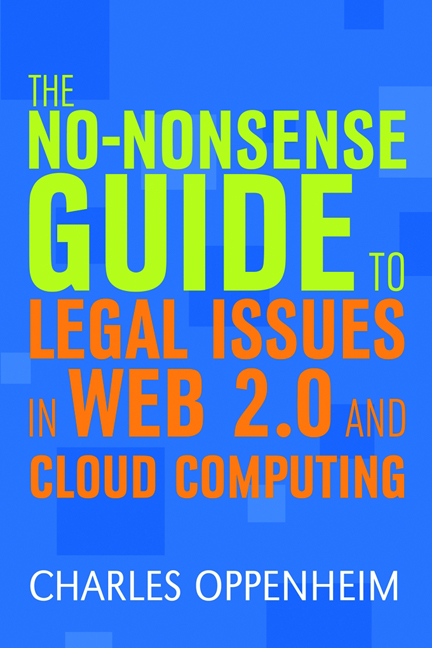3 - Other intellectual property rights and related rights
Published online by Cambridge University Press: 08 June 2018
Summary
Introduction
Copyright is not the only type of IPR that someone running, or contributing to, a Web 2.0 service needs to be aware of. There are a large number of other types of IPR they might encounter, such as database right, moral rights, performers’ rights, trademarks or domain names and patents. This chapter considers each of them, outlining some of the pitfalls that Web 2.0 users might fall into.
Database rights
In normal everyday usage, a database might be defined as ‘a large collection of data, works and other elements stored electronically’, but the formal legal definition in the CDPA is somewhat different. It defines a database as ‘a collection of independent works, data or other materials arranged in a systematic or methodical way and individually accessible by electronic or other means’. There are two key differences between the common-sense definition and the formal legal definition. The first is that that the database does not have to be electronic – it could be a collection of printed items or photographs, and so on. The second is that the word ‘large’ does not appear, so even a very modest collection of (say) a dozen items could be considered a database in law. The two definitions do have one thing in common though – there is no requirement in either definition that each individual item enjoys copyright or any other kind of IPR in its own right.
Exercise 1
Which of the following would be considered to be a database in law?
• the personal library of someone, comprising books and magazines
• a university library online catalogue
• a collection of First World War poems
• a list of shorthand nicknames for, and full e-mail addresses of, contacts, as held by a regular e-mail user
• an e-mail thread comprising various contributions, some lengthy and some not, from various individuals
• someone's bank statement
• a list of the melting points of a few dozen inorganic compounds
• a collection of postings on Facebook
• a single document built up by several contributor individuals on a wiki.
- Type
- Chapter
- Information
- Publisher: FacetPrint publication year: 2012



